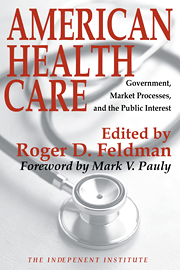Policy analysts are beginning to realize that the Food and Drug Administration often does more harm than good.
Consider the FDA’s restrictions on pharmaceutical manufacturers’ ability to advertise drugs both to consumers and physicians. Such advertising would be the most effective method of informing physicians and consumers of many health benefits.
For example, it has long been known that a regular dose of aspirin can reduce the risk of heart attack in middle age by almost one-half. Bayer even makes a small coated aspirin for just this purpose.
One recent study also shows that when aspirin users do suffer heart attacks, they are much milder than attacks suffered by others. Another finds that aspirin can sometimes cut the rate of colon cancer by 40%.
Each year, 700,000 Americans die of heart-related disease and 50,000 die from colon cancer.
But thanks to the FDA, many don’t know that aspirin could help. Most consumers are unaware that some drugs used for one ailment may be quite effective for others. And the FDA forbids manufacturers from advertising the heart attack benefit of regular aspirin use. For the thousands at risk for heart attack, the FDA’s gag order is a prescription for disaster.
The FDA says consumers can get this information from their doctors. But many consumers don’t visit physicians routinely, and many physicians don’t suggest aspirin.
A recent survey shows that only one-third of patients with a history of heart trouble have ever talked to a physician about aspirin to reduce risk. And that drops to 13% among people over 50 with no history of heart disease.
Advertising could persuade many patients to ask about aspirin. This could reduce the annual number of needless deaths by tens of thousands.
What motivates the FDA? Fear that regular aspirin use slightly increases the risk of stroke for some. But the benefits far outweigh the increased risk. Advertising could caution consumers where risks outweigh benefits.
This behavior is typical of the agency. It invariably places a much greater weight on any potential harm from a drug than on any benefit. This explains the tremendous delays in FDA approval of new drugs: The agency is much more fearful of approving a harmful drug than of delaying or blocking a beneficial one. The result is excess deaths.
Other drugs also suffer from the FDA’s advertising restrictions. For prescription drugs, it insists that most advertising aimed at consumers contain a one page "brief summary" in unintelligible language. Nicotine patches or gum, both effective smoking-cessation aids, require this page of warnings. As a result, prescription-drug ads can appear on TV only if they don’t mention what the drugs are used for.
Recently, the FDA forbade manufacturers from informing physicians about research on "unapproved uses" for prescription drugs, even though the research may have been published in leading journals and physicians are allowed to prescribe any drug for any use. This policy is particularly harmful for anti-cancer drugs, where about one-third of all prescriptions are for unapproved uses.
The FDA says that drug manufacturers should seek approval for new uses. This can take as long as getting approval for the first use, and we already know that this process is too slow. Because the patent may expire before the new use is approved, companies often do not bother to seek such approval.
Regulations of truthful advertising may violate the First Amendment. But firms are unwilling to challenge it in court because the FDA wields enormous power over them. It regulates drug manufacturing and decides what drugs may be sold. Pharmaceutical companies fear that speaking out against the FDA would invite regulatory revenge.
Some authorities advocate shifting advertising regulation from the FDA to the weaker Federal Trade Commission to encourage firms to challenge unjustified or harmful regulations.
Granting excessive power to any government agency to restrict speech is a tremendous risk. In the case of the FDA, restrictions on free speech have literally stopped innocent people dead in their tracks.









